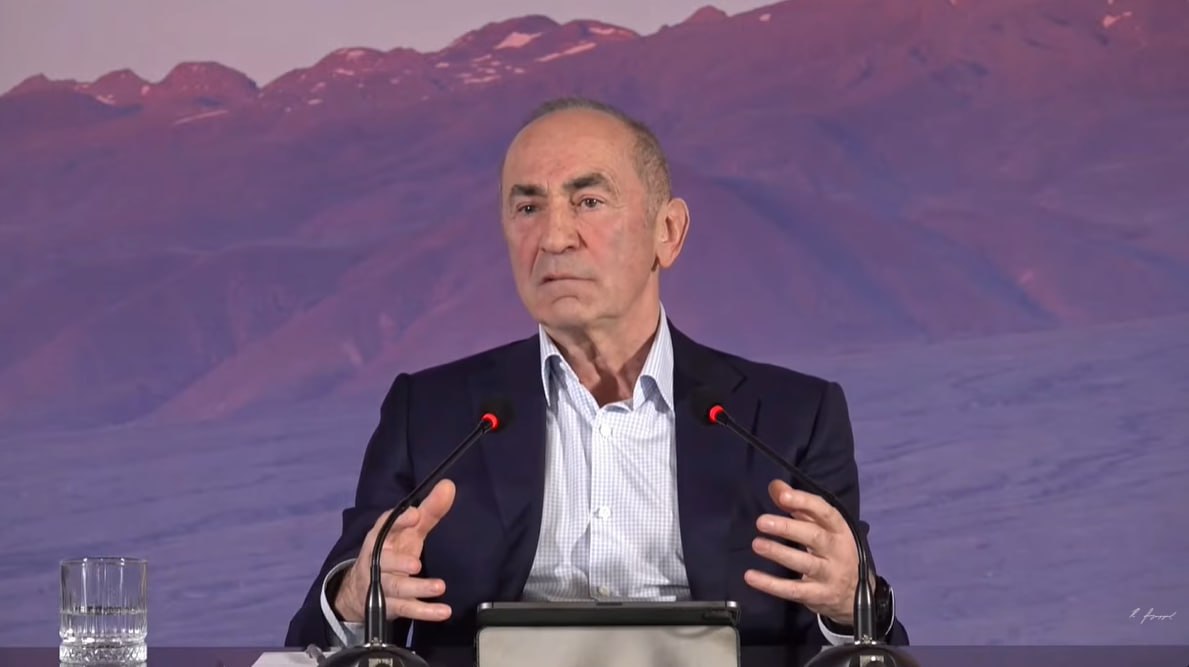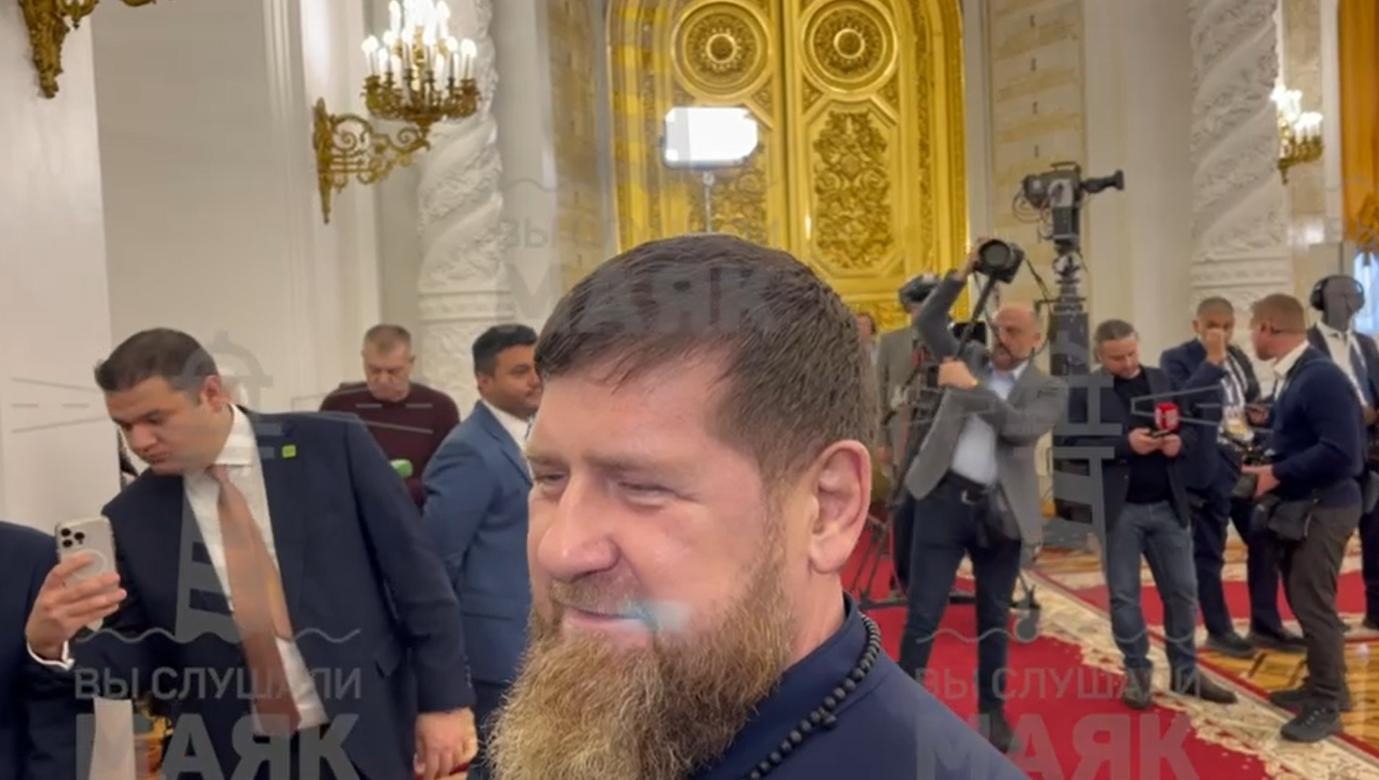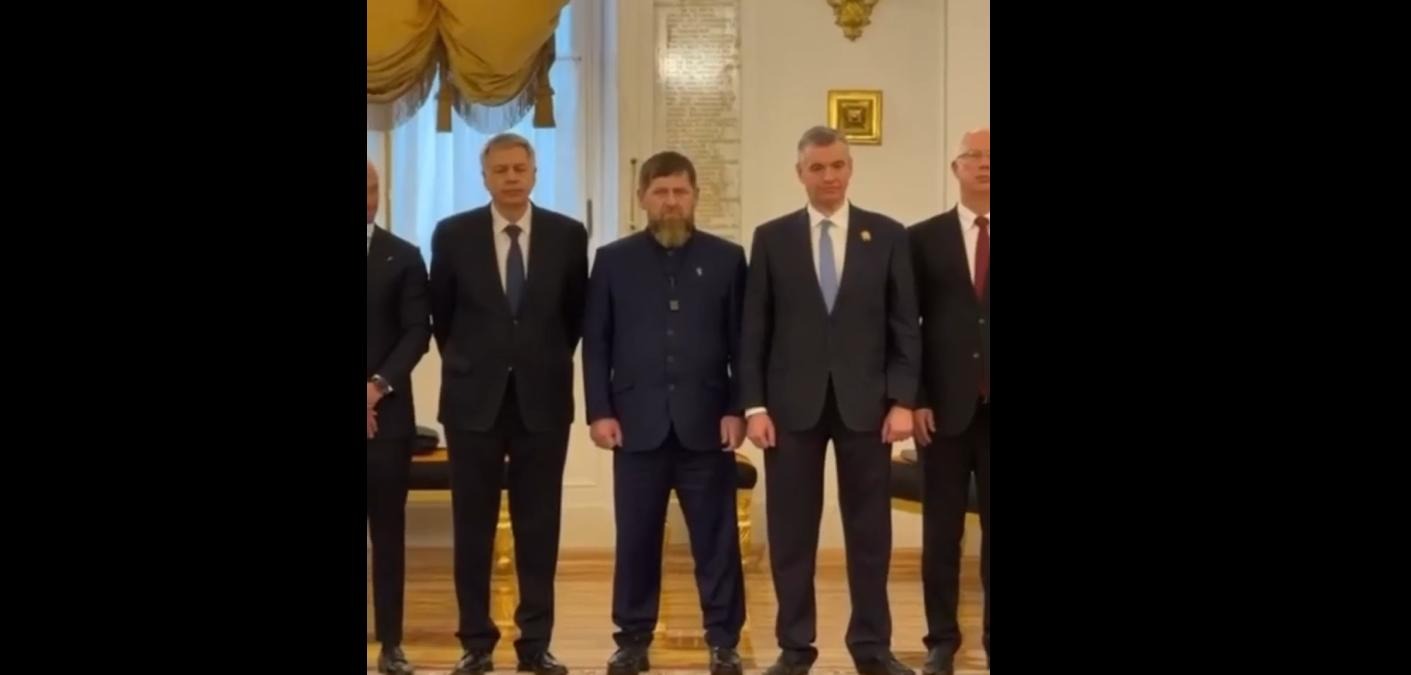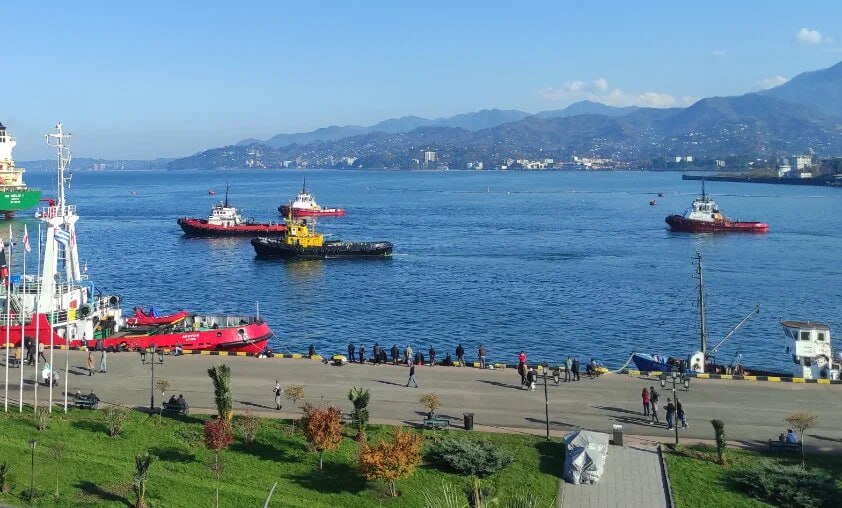Former Armenian President Robert Kocharyan warned against the current government's flippant attitude toward possible harsh responses from Moscow. He believes the authorities fail to grasp the scale of the potential impact Russia could have, including tariff revisions and export blockages.

September 26, 2001
***
Electricity was cut off in the village of Starye Atagi (there was no gas there for the last year). At dawn the next day, the settlement was completely blocked, after which the delivery of food and medicine stopped, schools and medical institutions stopped working. The village actually found itself in a state of siege. As it turned out later, for a long time: Russian units carried out a “cleansing” operation in it until October 6 inclusive.
It began with military trucks and armored vehicles entering the streets. The license plates on armored personnel carriers and vehicles, including those intended for transporting prisoners, were covered with black paint and dirt or wrapped in rags. At night they were withdrawn from the village, and then its outskirts and residential areas were subjected to mortar and artillery fire.
In addition to explosives, intelligence officers (FSB and GRU) also took part in the operation. At least five generals arrived.
The course of the operation can be divided into two stages. For the first three days, the military checked the documents of local residents and searched their households. Detentions were also made: people who aroused suspicion were taken to the territory of a poultry farm on the outskirts of the village, where a temporary filtration point was located, and there they were interrogated with beatings and torture. Despite this, the situation in the village did not go beyond the usual, standard “cleansing”, tested in dozens of settlements in Chechnya. Local residents, accustomed to daily violations of their rights and freedoms, patiently waited for it to end. But they were afraid of a provocation that the military could use to tighten their actions.
However, it was not needed. For them to begin to behave more cheekily and rudely, it was enough for the journalists of the Russian television channel REN-TV to leave the village and clash with militants.
On September 30, in the center of Starye Atagi, in the Matsievs’ house, the military discovered an underground shelter in which three people were hiding: 22-year-old Timur Sutaev, 27-year-old Musa Sadayev and Arab Abu Yakub. During the ensuing shootout, all three were killed. Weapons and lists of members of the All-Russian Federation of ChRI were recovered from the cache. Bilan Matsiev, the owner of the house in which the murdered were hiding, was arrested and taken to the territory of the poultry farm. While leaving, the military blew up the house and outbuildings of the detainee's uncle. He was later released and then went into hiding. According to fellow villagers, Bilan Matsiev is now abroad.
On the same day, in the attic of house 12 on Uchitelskaya Street, which belonged to Alvi Maayev, born in 1936, Russian servicemen, M.V. Kobolev and A.P. Kolov, captured by militants, were found. The house was set on fire and the owner was arrested. He was released on the third day with the assistance of the head of the village administration.
On October 1, the temporary press center of the Russian Ministry of Internal Affairs reported that the murdered Abu Yaqub was the intelligence chief of the famous field commander Khattab. It was also reported: “... two more mercenary militants were killed, and one was captured <...> A large amount of weapons and ammunition was seized from the cache in which the bandits were hiding, in particular, a homemade mortar with ammunition, two grenade launchers, seven Kalashnikov assault rifles with magazines, two shots for an under-barrel grenade launcher, 18 combat grenades, three artillery shells and 400 rounds of ammunition for automatic weapons.”
The next day, at a press conference in Moscow, Russian Presidential Aide Sergei Yastrzhembsky painted an impressive picture of the “successful purge.” The Interfak-AVN agency reported this press conference as follows:
“In the area of the villages of Duba-Yurt, Chiri-Yurt, Old and New Atagi, there were six groups of militants with a total number of 60 to 100 people, subordinate to the head of Khattab’s intelligence service, Jordanian Abu Yaqub, who was killed on September 30, said <...> Assistant to the President of the Russian Federation Sergei Yastrzhembsky. He emphasized that “to date, three groups of Yakub militants have been completely destroyed. <…>.
The presidential aide noted that 39-year-old Jordanian A. Yaqub, known by the nickname “Salman,” was “one of Khattab’s most qualified militants, through whom funding flows passed.” Yakub led “reconnaissance of militants” and after the death of field commander Arbi Barayev “tried to gather the scattered gangs.”
S. Yastrzhembsky said that work to destroy Yakub’s gangs continues. In this regard, he recalled the discovery of caches and caches of weapons in Starye and Novye Atagi. “In one of the caches, space communication telephones, established fax communications, and computers were discovered,” he noted.”
The computers that were allegedly found in the militants’ cache actually belonged to the Czech humanitarian foundation “Man in Need.” They were seized by the military during a search of the Musaev family's house on September 28. On this day, houses on Beregovaya Street were inspected. Ali Musayev, an employee of a humanitarian foundation, lives here at house 14. This organization has been working in Chechnya since the beginning of the war and is engaged in supplying food and restoring housing destroyed during the fighting. “People in Need” carries out some of its programs under the auspices of UNHCR. The Musayevs' house housed the equipment necessary for the program to restore destroyed houses in the village of Duba-Yurt, as well as the documentation of this program. Having discovered computers, a printer, an uninterruptible power supply, a copy machine and folders with documentation in the house, the military immediately called their superiors, after which they announced the need to seize the computer “to check the information recorded in it.” The seizure was carried out in the presence of the head of the village administration, Vakha Gadaev. Despite the protests of the house owners, all other equipment and documentation were taken away along with the computer. When asked what the military was going to check in the copier and uninterruptible power supply, there was no answer. No act of seizure was left with either Musaev or the head of the administration. On the street, the military laid out the seized equipment on the hood of the car and recorded it on videotape.
However, in many other houses of Starye Atagi, representatives of the federal forces behaved much worse. First of all, members of the Maayev and Matsiev families suffered. The houses of Ruslan Maayev, Aindi Maayev and Khamid Maayev were robbed. At the same time, the wife of the last of them, 60-year-old Leila, was beaten. The houses of Khasan Maayev and brother Adam Matsiev were burned. The small house of Adam Matsiev himself was blown up on October 2. But it is obvious that the robberies were a punitive action not only against “guilty” people. The houses of Aindi Nogamerzaev, Tamerlan Omaev, Suleiman Tasuev, Alkhazur Magomadov, Magomed Yandarbiev, Alkhazur Usidov, Sultan Gadaev, etc. were subjected to widespread looting. The Oshaevs, Gireevs, Chankaevs, Ampukaevs, Bashaevs, Dzhamaldinovs, Sambievs, Dzhumaevs and many other families of the village lost their property.
Trucks and armored personnel carriers were driven into the courtyards of the wealthiest households and loaded with carpets, furniture, audio and video equipment, dishes and clothes. In others, not disdaining anything, they took a little of everything: kitchen utensils, bed and underwear, cosmetics, etc.
On the day of the unblocking of Starye Atagi, cars with carpets, furniture and dishes arrived at the military base in Khankala. The cargo was immediately dismantled by the officers and their wives. According to base workers from among local residents, one of the officer’s wives was extremely dissatisfied that they did not bring a carpet of the size and color she needed.
About 50 trucks and cars were seized from local residents. Those that could not be driven away due to a malfunction were smashed or set on fire. Moreover, even motorcycles and bicycles were taken away. When the “cleansing” was over, the owners had to buy back most of the cars (more precisely, what was left of them after disassembling them for spare parts). Four cars disappeared, most likely having acquired new owners in the person of the Russian military. The remains of four more were discovered later on the territory of a former poultry farm, to which both detained people and property looted from their homes were delivered.
The military also took the horses there, drove away dozens of heads of large and small livestock, and carried away a lot of poultry. Their gnawed bones were later found next to empty liquor bottles.
The hay of Alkhazur Usidov, who lived on Sadovaya Street, and the Gekhaev family from Shosseynaya Street was burned.
One of the village mosques (small) was also burned. All bridges were blown up, except one at the Ataginsky state farm next to the poultry farm and mill (the location of the Russian part). The military carried out a pogrom at the local hospital, claiming without any basis that militants were hiding in its basements. They ripped up the floors in the office premises and wards, smashed and took away medical equipment and supplies. Hospital staff were sent home and patients were thrown out into the street.
The entire male population of Starye Atagi from 14 to 60 years old was subjected to almost complete “filtration.” There were often cases when people were detained several times: after checking they were released, but soon other military officers detained them again.
On the territory of a former poultry farm they were lined up in long lines. Those who were pointed out by unknown people in military uniform and masks were taken out of action and taken aside, the rest were released. Selected Atagin residents were subjected to severe beatings and torture. The screams of the tortured were heard by relatives of the detainees who had gathered near this place.
After their release, the victims told their fellow villagers about the nightmare they had to endure. The “federals” beat people until they lost consciousness, then revived them and continued beating them again, tortured them with electric shocks, pinched their fingers and toes with tongs and pliers, put soldiers’ helmets on their heads and beat them with a sledgehammer, and burned their bodies with cigarette butts. Some were herded into paddy wagons overnight and placed in the so-called. “glasses” are cramped metal containers measuring 50x50 cm and more than a meter high, in which it was impossible to sit down or bend over. People who had spent a sleepless night in a standing position were taken away for interrogation in the morning, and this continued for five to six days.
Among those who underwent cruel torture are Ilyas Alkaev, 22 years old, Salman Minazov, born in 1968, father of three children (he lived in Ingushetia as a refugee and ended up in the village by chance: he came to visit his sick mother) and others. Some Atagin residents who returned home after liberation underwent treatment for a long time, and 55-year-old Vakha Islaev died.
Khusein, Khasan and Movsar Mashtakov, 37, 36 and 34 years old, respectively, were detained and severely beaten. The military broke into their place, at 8 Mayskaya Street, at about eight o’clock on September 26. They didn’t even ask the brothers for their passports; they stayed at home. A machine gun was shot at the feet of the women who were trying to show their documents - their mother, wives and sisters, as well as the children present. Having tied their hands behind their backs and pushed them into an armored personnel carrier, all three were taken to a poultry farm. The next day, Movsar Mashtakov returned from there, bruised and bleeding. He said that they were beaten with batons and kicked, demanding to know why their elder brother, who died in the first war (1994–1996), was awarded the Order of the ChRI “Honor of the Nation” (“Koman siy”). One form of abuse was as follows: detainees were forced to climb onto a high concrete column and jump down. Those who lost their balance and fell were beaten again.
According to him, Khusein and Khasan (sick with a stomach ulcer) Mashtakov were to be taken to the village of Tolstoy-Yurt. One of the soldiers told him this upon his release. And so it happened: after seven days of being kept on the territory of a former poultry farm, they were transported to the regional center and, having been placed in a temporary detention facility at the Grozny District VOVD, a criminal case was opened (No. 19162). Among other things, they tried to charge them with participation in the detachment of “field commander Bilan Matsiev.” The “field commander” himself had already been released by that time, but the piquancy of the situation lay not only in this. At the beginning of the second war, both brothers were members of the village militia under the command of Russian FSB officer Umar Bilbaev, who was killed by unknown assailants on December 27, 2000. By doing this, they already contrasted themselves with the armed supporters of Chechen independence. Subsequently, the amnesty act adopted by the State Duma of the Russian Federation in May 2000 was applied to them, the criminal case was dropped, and both were released.
However, the military personnel who came to “clean up” treated equally both those who were suspected of sympathizing with members of the WF of the ChRI, and those who openly took pro-Russian positions. They disarmed the local police officers and kept some of them under guard in the commandant's office for almost a week.
Among many of the especially affected Ataga residents were people of retirement age, teenagers, and even a child. 13-year-old Vakha Shavanov was detained along with his uncle on one of the first days of the “cleansing” and for a long time nothing could be learned about their fate. The military claimed that they had been released. Only after complaints from relatives were received by the district prosecutor's office, both were taken to the outskirts of the village at night and thrown out there. The boy was severely beaten and was in a semi-conscious state.
More than ten people suspected of providing assistance to the VF of the ChRI or participating in hostilities were taken to Tolstoy-Yurt and kept in a temporary detention facility at the Grozny District Department of Internal Affairs. Here the attitude towards them was better, except for the first days, when drunken police officers severely beat Bilan Matsiev and mocked 65-year-old Alvi Maayev. Subsequently, all the detained residents of Starye Atagi were released, some for ransom in money or weapons.
Along with the people mentioned above, the following were detained: Khasan Esambaev and his sons Anzor and Muslim, living on Ambulatornaya Street (released two days later); Said-Husein Bachaev, born in 1970 (also released two days later); Adam Taramov, born in 1975, and his father, living on Kh. Nuradilov Street (were able to return home only on the third day); Khamzatovs: Khasan, about 60 years old, and Said-Magomed, 60 years old, Shosseynaya St., (the latter was released on October 4); four people from the Musipov family and two from the Gekhaev family.
During the “cleansing”, conflicts repeatedly arose between the military and representatives of local authorities - the head of the administration and local police officers. The military even detained some police officers several times, accusing them of “covering up” for the militants. The military carried out a pogrom in the house of the head of the village administration, Vakha Gadaev. At the same time, they stated: it is suspicious that he is still alive, while many other heads of rural administrations have been killed. Such actions may have been caused by the behavior of local government representatives who refused to sign a document stating that the “passport regime verification operation” in the village took place without violations. In addition to Vakha Gadaev (who did not risk spending the night in his house for several days afterwards), his deputy Dzhumaev also refused to do this.
The Chechen OMON officers who arrived in the village to participate in the “cleansing” witnessed how the Russian military beat and tortured the wife and son of a detained man. They demanded to stop the arbitrariness, and a clash broke out between them. As a result, on September 28, the Chechen riot police were ordered to leave the village and return to their base in Grozny.
***
From September 26 to 28, a “cleanup” took place in the village of Novye Atagi. And here the Russian military robbed the houses of local residents, detained and beat people.
In total, during the operation they captured and then released more than 20 people. Among them was Birlant Takhtarova. During a search of her home, a pistol was found. The weapon (service) belonged to Gelani’s husband Takhtarov, a riot policeman of the Chechen Republic. But that day he was not in the village. The Russian military beat all members of his family and threatened to take him to a filtration point. Trying to prevent this, the woman said that the gun belonged to her and that she was a “militant.” She was immediately detained. Before leaving, the military also robbed the house, taking out the most valuable things.
***
From September 26 to October 6, the Russian military carried out a “cleansing operation” in the village of Chiri-Yurt. In the first days they detained more than 100 people. After checking their documents, they were all released.
In the last five days of the “cleansing” operation, another 30 village residents were captured. Some of them were kept even after it ended. Human Rights Center “Memorial” knows, for example, that Khizir Elmurzaev, born in 1944, was released on the day of his arrest, and Uvays Elmurzaev, born in 1967, four or five days later.
Uvais Makhmudovich Khamaev, born in 1973, and his brother Aslambek Makhmudovich Khamaev, born in 1976, who lived on K. Marx Street (the first in house 37, and the second in house 18) were also taken away. They were also released, but refused to say anything about how this happened.
Ramzan Shaipov, born in 1975, according to information available at the end of 2007, went missing. Shamkhan Shaaevich Dashaev, born in 1964, also disappeared. (he was registered at 13 Kh. Nuradilov St.), and one or two more (Memorial Human Rights Center staff were unable to establish this for sure) village residents.
All detainees were subjected to beatings and torture (using electric shock, batons, machine gun butts, etc.), which is why many were in serious condition after their release, and some were forced to go to medical institutions.
As in neighboring settlements, the “cleansing” in Chiri-Yurt was accompanied by robberies and pogroms. The Dzhambekovs and Elmurzaevs’ households have been completely “cleansed” of property. A mosque in the village was burned down. The military desecrated the books sacred to Muslims (the Koran, Yasin, etc.) - they were also set on fire. The building of the Islamic theological school - madrasah - was burned.
From the book “People Live Here”, Usam Baysaev, Dmitry Grushkin, 2006.



